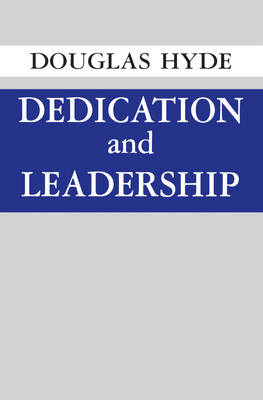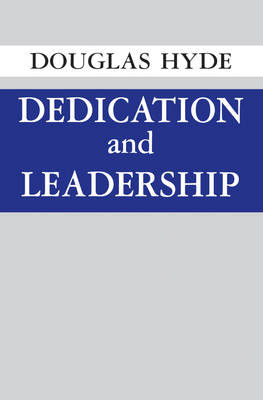
- Retrait gratuit dans votre magasin Club
- 7.000.000 titres dans notre catalogue
- Payer en toute sécurité
- Toujours un magasin près de chez vous
- Retrait gratuit dans votre magasin Club
- 7.000.0000 titres dans notre catalogue
- Payer en toute sécurité
- Toujours un magasin près de chez vous
Description
On March 14, 1948, Douglas Hyde handed in his resignation as the news editor of the London Daily Worker and wrote "the end" to twenty years of his life as a member of the Communist Party. A week later, in a written statement, Hyde announced that he had renounced Communism and, with his wife and children, was joining the Catholic Church.
The long pilgrimage from Communism to Christ carried Douglas Hyde from complete commitment to Marxism, to a questioning uneasiness about Soviet Russia's glaring contradictions of ideology and action, to a final rejection of the Party.
In Dedication and Leadership, Hyde advances the theory that although the goals and aims of Communism are antithetical to human dignity and the rights of the individual, there is much to be learned from communist methods, cadres and psychological motivation. Hyde describes the Communist mechanics of instilling dedication, the first prerequisite for leadership. Here is the complete rationale of party technique: how to stimulate the willingness to sacrifice; the advisability of making big demands to insure a big response; the inspirational indoctrination; and the subtle conversion methods.
In this small book, so large with implications, Douglas Hyde comments on both Communist and Catholic potential and their lack of maximum effectiveness. He advocates positive Catholic action, not just a negative anti-Communism, and he points out that the guidelines are now down for a decisive choice between total Communism and a total Christianity.
Here is a realistic approach to an acute problem uncolored by emotional propaganda, and here is a realistic answer on how to inspire dedication for leadership.
Spécifications
Parties prenantes
- Auteur(s) :
- Editeur:
Contenu
- Nombre de pages :
- 160
- Langue:
- Anglais
Caractéristiques
- EAN:
- 9780268000738
- Date de parution :
- 21-03-66
- Format:
- Livre broché
- Format numérique:
- Trade paperback (VS)
- Dimensions :
- 135 mm x 199 mm
- Poids :
- 195 g

Les avis
Nous publions uniquement les avis qui respectent les conditions requises. Consultez nos conditions pour les avis.






